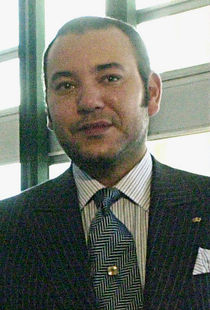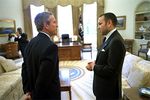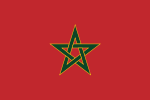Mohammed VI of Morocco
| Mohammed VI | |
|---|---|
 |
|
|
|
|
| Reign | 23 July 1999 – present (10 years) |
| Predecessor | Hassan II |
| Spouse | Princess Lalla Salma |
| Issue | |
| Moulay Hassan Lalla Khadija |
|
| Father | Hassan II |
| Mother | Lalla Latifa Hammou |
| Born | 21 August 1963 Rabat, Morocco |
| Religion | Muslim |
Mohammed VI (Arabic: محمد السادس) is the present King of Morocco. He was born on 21 August 1963[1] and ascended to the Throne in July 1999.[2]
Contents |
Education
His father, the late King Hassan II, was keen on giving him a religious and political education from an early age. At the age of four, he started attending the Qur'anic school at the Royal Palace[1] where he learned the Qur'an by heart, and received a religious and traditional education.
After primary and secondary studies at the Royal College and after he received his Baccalaureate in 1981, Mohammed obtained in 1985 a B.A in law at the College of law of the Mohammed V University in Rabat. His research paper dealt with "the Arab-African Union and the Strategy of the Kingdom of Morocco in matters of International Relations".[1]
In 1987 he obtained his first Certificat d'Études Supérieures (CES) in political sciences and in July 1988 he obtained a Diplôme d'Études Approfondies DEA in public law.[1]
In November 1988 he trained in Brussels with Jacques Delors, then President of the European Commission.[1]
He obtained his doctorate in law (PhD) with distinction on 29 October 1993 from the French University of Nice Sophia Antipolis for his thesis on "EEC-Maghreb Relations".[1]
He is the recipient of an honorary degree by American The George Washington University awarded in 22 June 2000 for his promotion of democracy in Morocco.
Mohammed was promoted to the rank of Major General on 12 July 1994.
Social reform and liberalization

Shortly after he took the Throne, he addressed his nation via television, promising to take on poverty and corruption, while creating jobs and improving Morocco's human rights record. Mohammed VI is generally opposed by Islamist conservatives, and some of his reforms have angered fundamentalists. He also created a new family code, or Mudawana, which granted women more power.[3] The law came into effect in February, 2004.
 |
|
Mohammed VI also created the so-called Instance Equité et Réconciliation (IER), a commission, which was supposed to research human rights violations under Hassan II. The commission was however not allowed to report about human rights violations until 1999, when Mohammed was enthroned. This move was welcomed by many as a move towards democracy, but also criticized because reports of human rights violations could not name the perpetrators. According to human rights organisations abuses still exist in Morocco.[4][5][6]
Wealth
Mohammed and his family have stock in the ONA Group which is a Holding invested in several areas of activity (mining, food processing, retail and financial services,...) giving the Royal Family one of the largest fortunes in the world. Mohammed is estimated by Forbes to be worth $2 billion. His palace's daily operating budget is reported to be $960,000, owing much of it to the expense of clothes and car repair.[7]
Family
Mohammed has one brother, Prince Moulay Rachid, and three sisters, Princess Lalla Meryem, Princess Lalla Asma, and Princess Lalla Hasna. On 21 March 2002 he married Salma Bennani (now H.R.H. Princess Lalla Salma) in Rabat, giving her the title of Princess. Princess Lalla Salma has two children, Crown Prince Moulay Hassan, who was born on 8 May 2003, and Princess Lalla Khadija, who was born on 28 February 2007.[3]
Prophetic ancestry
The Alaouite dynasty claims descent from the Prophet Muhammad by way of his daughter Fatimah, the only one of his children to survive into adulthood. Members of the Alaouite dynasty are thus considered to be ashraf.[8]
- Muhammad, Prophet of Islam (died 632)
- Fatimah
- Hasan ibn Ali (died 670)
- Hasan II
- Abdullah al-Kamal
- Muhammad al-Mahdi
- Hasan
- Muhammad
- Abdullah
- Qasim
- Ismail
- Ahmad
- Hasan
- Ali
- Abubakr
- Hasan
- Abu Muhammad Arafa
- Abdullah
- Hasan
- Muhammad
- Belqasim
- Muhammad
- Qasim
- Al Hassan Addakhil (came to the Tafilalt region in Morocco in 1266)[9]
- Muhammad
- Hasan
- Ali ash-Sharif
- Yusuf
- Ali
- Muhammad
- Ali
- Muhammad I ash-Sharif, King of Tafilalt (died 1659)
- Moulay Ismail, Sultan of Morocco (died 1727)
- Moulay Abdullah, Sultan of Morocco (died 1757)
- Sidi Muhammad III, Sultan of Morocco (died 1790)
- Moulay Hisham, Sultan of Morocco (died 1796)
- Moulay Abd ar-Rahman, Sultan of Morocco (died 1859)
- Moulay Muhammad IV, Sultan of Morocco (died 1873)
- Moulay al-Hasan I, Sultan of Morocco (died 1894)
- Moulay Yusuf, Sultan of Morocco (died 1927)
- Mohammed V, King of Morocco (died 1961)
- Hassan II, King of Morocco (died 1999)
- Mohammed VI, King of Morocco (born 1963)
See also
- Alaouite dynasty
- Kings of Morocco
References
- ↑ 1.0 1.1 1.2 1.3 1.4 1.5 "His Majesty King Mohammed Ben Al-Hassan". Embassy of the Kingdom of Morocco. http://dcusa.themoroccanembassy.com/moroccan_embassy_political_system_the_king.aspx. Retrieved 18 February 2010.
- ↑ "World: Africa Mohammed VI takes Moroccan throne". BBC News. 24 July 1999. http://news.bbc.co.uk/1/hi/world/africa/402712.stm. Retrieved 18 February 2010.
- ↑ 3.0 3.1 "Morocco country profile". BBC News. 16 December 2009. http://news.bbc.co.uk/1/hi/world/africa/country_profiles/791867.stm. Retrieved 18 February 2010.
- ↑ MacFarquhar, Neil (1 October 2005). "In Morocco, a Rights Movement, at the King's Pace". New York Times. http://www.nytimes.com/2005/10/01/international/africa/01morocco.html?pagewanted=print. Retrieved 18 February 2010.
- ↑ "Facing up to Morocco's hidden fear". BBC News. 19 April 2005. http://news.bbc.co.uk/1/hi/world/africa/4457267.stm. Retrieved 18 February 2010.
- ↑ "Morocco/Western Sahara: Amnesty International welcomes public hearings into past violations". Amnesty International. http://www.amnestyusa.org/document.php?lang=e&id=80256DD400782B8480256F6A003CF643. Retrieved 18 February 2010.
- ↑ http://www.forbes.com/2007/08/30/worlds-richest-royals-biz-royals07-cx_lk_0830royalintro_slide_8.html?thisSpeed=30000
- ↑ Montgomery-Massingberd, Hugh, ed (1980). "Appendix C: Descendants of the Prophet". Burke's Royal Families of the World. Volume II: Africa & the Middle East. London: Burke's Peerage. pp. 281–282. ISBN 9780850110296. OCLC 18496936.
- ↑ Auzias, Dominique; Labourdette, Jean-Paul (2009) (in French). Fès, Meknès. Petit Futé. Paris: Nouvelles éditions de l'Université. p. 47. ISBN 9782746924987. OCLC 470970264. http://books.google.com/books?id=pB4PR9tuKMEC&pg=PA47. Retrieved 2010-07-11.
External links
- Official site(In French)
- Morocco Alaoui dynasty
- History of Morocco
- King Mohammed VI Grants Exclusive First-ever Interview to Time
- Laurenson, John. The most powerful man in Morocco, BBC News, 11 March 2006.
- King Mohammed's luxury car collection
|
Mohammed VI of Morocco
House of Alaoui
Born: 21 August 1963 |
||
| Regnal titles | ||
|---|---|---|
| Preceded by Hassan II |
King of Morocco 1999 – present |
Incumbent Heir: Moulay Hassan |